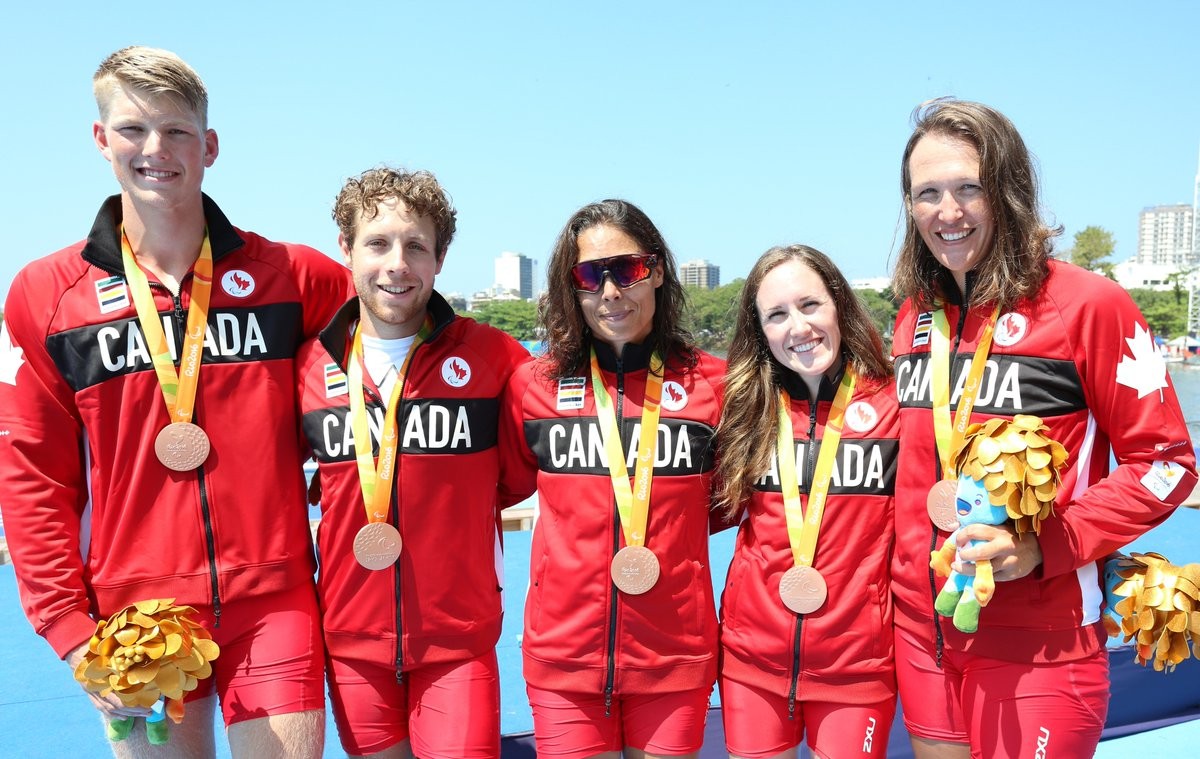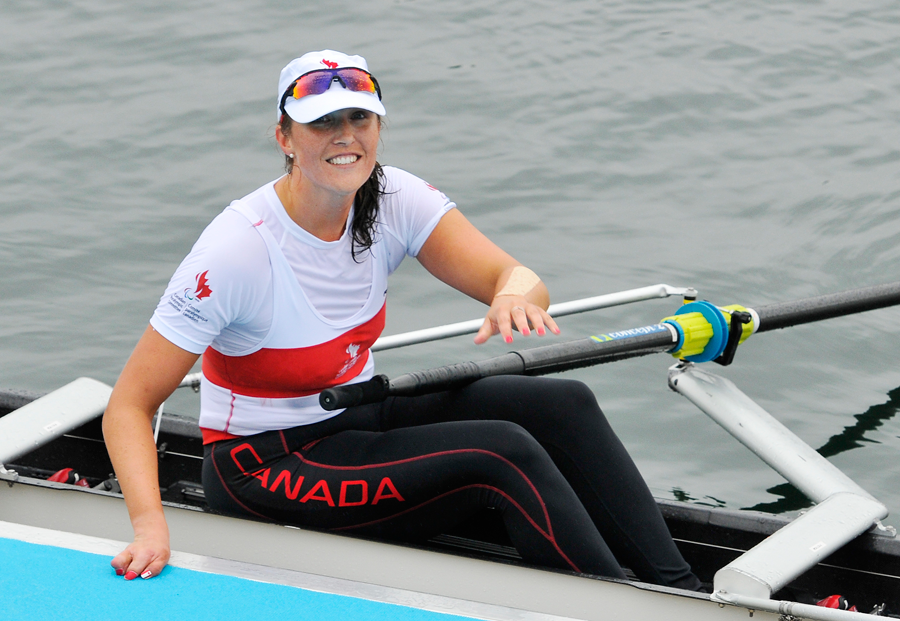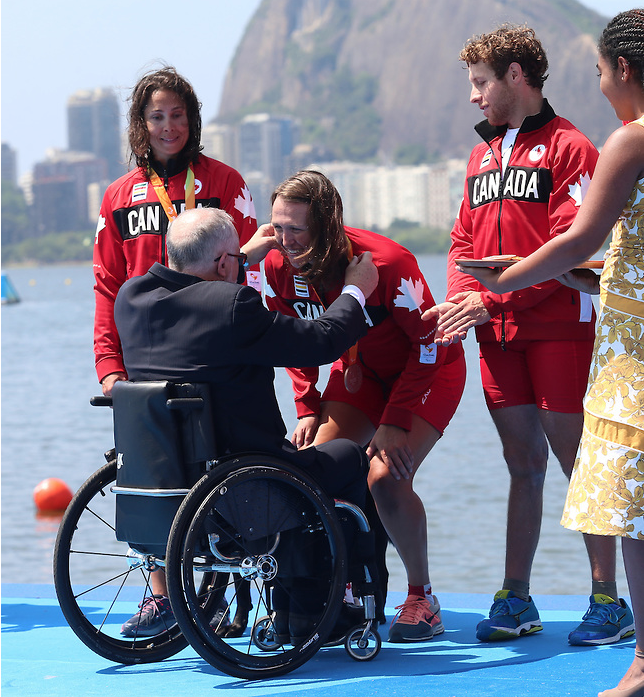
Meghan Montgomery (right) and teammates Victoria Nolan, Andrew Todd, Curtis Halladay and Kirsten Kit win bronze in the LTA mixed coxed four at the 2016 Paralympic Games in Rio. // Photo: Scott Grant, Canadian Paralympic Committee
Q&A with alumna Meghan Montgomery, Paralympian medallist
Meghan Montgomery, like many elite athletes, yearns for adversity. She wanted to be told she couldn’t row by the U of M crew when she was studying here. Instead they insisted there was no reason she couldn’t – they could find a way to accommodate her right hand, which required surgical corrections after birth.
To her, this was simultaneously upsetting and refreshing. She wanted them to say she couldn’t do it and then prove them wrong, yet she was happy they saw no barriers.
The paralympian recently returned to campus after winning bronze in Rio this summer. And after she chatted with the president, who caught her attention with his new Twitter account, UM Today sat down with her to learn about her journey, which you can follow on Instagram: @meghanrows.
Meghan Montgomery, BA/05, BEd/07
UM Today: What’s your story?
Meghan Montgomery: Born and raised in Winnipeg. I did my education here at the U of M. I started rowing in my second year of university – there was a little display outside of the Admin building. They had a boat and I happened to be wearing a UBC sweatshirt so they said, “Oh you’re from the west coast and your tall. You should come row!” I was like, “I’m not from the west coast. I’m tall though. But I don’t know if I can row because of my hand.” I went to the open house and I said I didn’t think I could do it and they said they could find a way.
What did they do?
We started off using a weight strap and taping it to the oar handle. That was good but it was restrictive.
Has your hand been like that from birth or did you have an accident?
No, this is from birth. I was born with all my fingers attached and through surgery was given digits. When I was born everything was stuck together and they took X-rays and found where the bones had fused and gave me what they could back. So a few fingers are stuck together.
What other sports do you play?
Through high school I played water polo and volleyball and basketball. I always tended to find sports that I, you know…I should have played soccer. That seems to be the obvious choice. But I tended to go to the sports that I didn’t know if I could do it. And when I got to rowing I was kind of looking for someone to say I couldn’t because I was going to try and find a way. But it ended up being amazing and the Winnipeg Rowing Club was awesome and very welcoming. I ended up making the provincial rowing team the following summer and going to Canada Summer Games in 2001 with Team Manitoba. So I was in an able-bodied program for many years. It wasn’t until 2005 that para-rowing came around, and through the grapevine the team heard about me and that’s how I ended up in para-rowing.
If you only got into rowing in university, that’s pretty fast rise, no?
You have to look at the situation. Para-rowing only came around in 2005, and I had already been rowing. I had a little bit of a jump on a lot of people – there wasn’t a ton of people with disabilities rowing. In fact, at that point in time, I didn’t even know I classified for the Paralympics because what I had seen and knew about the Paralympics was wheelchair racing or wheelchair basketball. That was my understanding of what the Paralympics was and my legs were fine.
Have you always been a competitive person?
Yes. I swam when I was a kid but my parents had to pull me out because I used to fall asleep in school. It wasn’t from the early mornings either – I think it was just a combination of growing and trying to be in a competitive swimming program. I’ve always liked swimming though. And I’ve always been competitive.
Why do you like rowing? It’s so gruelling. You spend your entire time in an anaerobic state. Why do you do it?
I like pain. But there’s something about putting yourself in the gutter every day. I like it.
A photo posted by Meghan (@meghanrows) on
What do you mean the gutter?
We train so much. Rowing is two or three times a day with usually a pretty heavy session in the morning, and then another fairly heavy session after that one, and then a weight session or core circuit. There’s just something so satisfying about being so tired. And when you see yourself improve it’s really rewarding.
Do you have any siblings?
Yeah, I have a brother. He actually works here in student records. We’re going for lunch tomorrow.
And today you met the president after he sent out a tweet. What happened?
I was recognized as an outstanding alum back in 2013 and it was kind of touching. Because when you’re here you feel like just another student among the thousands so I really appreciated that gesture. And then the alumni Twitter account often re-tweets what I put out or they congratulate me on things. So when David Barnard congratulated us over Twitter I was like, “You know, I should go back and say ‘hi.’ ” This is where I’m from and this is where rowing started for me, so it’s been nice to come back and relive the journey. The president was really excited to see the medal too.
Proud to have a brief visit from former UM student, paralympian Meghan Montgomery with her rowing medal @MeghanRows pic.twitter.com/BNsUCpFwSe — David T. Barnard (@um_president) September 26, 2016
How does it feel to have one?
Amazing. I’m still on Cloud 9. I’m sure there will be a down time but I’m still riding the wave.
How many Paralympics have you competed in?
Three: Beijing, London and Rio.
Are you retired now?
I don’t know. Beijing was eye opening and we weren’t well prepared mentally or emotionally. It was new to everyone – we were the first Canadian crews to represent Canada in para-rowing. It was overwhelming because we didn’t have anyone with games experience.
And then going into London, we had done all these great things during the quadrennial but I wasn’t enjoying the process anymore. We won gold in New Zealand in 2010 in the World Championships. It was amazing and great, but the rewards in training weren’t as great. And it felt like it was time to walk away. So after London I knew it was time to go. But then I missed it. I had unfinished business: I really wanted to be on the podium.
Then the program changed in a lot of ways and I came back because I knew that we’d improve our chances of being on the podium and I could leave happy.
Rio was the most rewarding Olympics, medal aside. Even going into it, I’d always been told by trainers, “Well you can’t hold onto the bar so we’re not going to have you do chin-ups.” But this time around we had a coach who was like, “Okay, we’re going to find a way to make this happen.” And I was doing chin-ups. I had never done chin-ups before! But I was doing chin-ups!
How’d that feel?
Pretty fricking amazing.
People always look to Paralympians as people who overcome barriers. Does that seem trite to you?
I guess no. When I was in high school I was playing basketball but I kind of held myself back a bit. I was really shy and I didn’t want to be noticed and I didn’t want my hand to be noticed. You’re at that age where you’re insecure and shy about things.
But I remember being at home in between games of a basketball tournament and I was hanging around with my parents, watching the news, and they had an interview with a guy from Regina who was playing basketball and he had lost his hand to cancer. And he was the best ball handler on their team. He was the point guard. He was doing it all. And I thought, “Oh shit. If he can do that, why am I stopping myself?” So I stepped up my game after that. I was in Grade 10 and I tried a little harder because is saw an example of someone doing it. So I like the Paralympics for that.
Does it baffle you that the Paralympics doesn’t get the same kind of media coverage as the Olympics?
Yes. How it doesn’t have the airtime the Olympics has is beyond me. What we’re told all the time is that no one will watch it, or not enough people. I call BS on that.
I think if people are going to watch darts or bowling, they’re going to watch the Paralympics. People like competition and we provide that.
It’s 2016! As Justin Trudeau would say.








